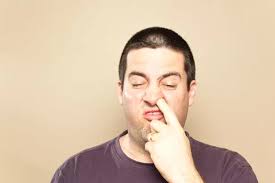Nose picking is a common yet often unconscious habit that many people, regardless of age or gender, develop to clear their noses. Despite its prevalence, it remains socially unacceptable and can lead to uncomfortable situations, especially in public. This behavior is scientifically known as rhinotillexomania and is often categorized as an obsessive-compulsive behavior that can be challenging to break.
A Personal Story
My older brother, a successful young professional, had an unconscious habit: he picked his nose. It wasn’t something he did deliberately; it happened mostly when he was deep in thought or stressed. Although he was unaware of it, those around him noticed, including friends and strangers alike.
One day, while on a crowded bus heading to an important meeting, he began to unconsciously pick his nose as he mentally prepared for his presentation. The other passengers noticed immediately. A young woman sitting next to him shifted uncomfortably, clearly disgusted. An older gentleman across from him frowned and muttered something under his breath. Even the bus driver caught a glimpse in the rearview mirror and shook his head in disapproval.

His habit was more than just a personal quirk; it was a social faux pas that made others uncomfortable. This scene was not uncommon—it had played out in various public spaces like meetings, restaurants, and even during casual strolls in the park.
Understanding Rhinotillexomania
There are several reasons why people develop this habit:
- Boredom: Nose picking can start as a nervous habit or as something to do when bored.
- Anxiety: For some, nose picking is a way to alleviate stress or anxiety.
- Medication: Certain medications, such as stimulants used to treat ADHD, can have side effects that include nose picking.
- Hormonal Changes: Studies have shown that women may experience this disorder during periods of hormonal changes.
Consequences of Nose Picking
Although nose picking is rarely harmful, it can cause bleeding and introduce bacteria into the nasal cavity. More importantly, it can damage your social standing, making others uncomfortable and negatively affecting your interactions.
How to Stop Picking Your Nose
If you’re looking to break this habit, consider the following steps:
- Maintain Cleanliness: Regularly wash your nose with water.
- Blow Your Nose: Keep your nose clean by blowing it frequently.
- Keep Your Hands Busy: Find other activities, like squeezing a stress ball, to keep your hands occupied.
- Trim Nose Hair: Reducing nose hair can lessen the temptation to pick.
- Manage Allergies: Address allergies to reduce nasal irritation.
- Stay Conscious: Be aware of your actions and actively work to stop the habit.
- Be Patient: Breaking a habit takes time, so be patient with yourself.
The Turning Point
The turning point for my brother came when I had an honest conversation with him. “John,” I gently began, “I’ve noticed you pick your nose a lot, especially when you’re stressed or thinking hard. It’s not something people usually talk about, but I think it’s affecting how others perceive you.”
He was surprised. He had never realized his unconscious habit was so noticeable. Though embarrassed, he was grateful for my honesty and decided to take action. He started by keeping his hands busy with a stress ball during meetings and long bus rides. He also made a habit of washing and blowing his nose regularly to keep it clean.
The Transformation
With conscious effort and support from our family, John gradually broke free from his habit. He noticed a positive change in how people interacted with him. Colleagues became more comfortable around him, and strangers no longer gave him disapproving looks. As a result, John’s confidence grew as he managed to overcome this socially awkward habit.
Nose picking might seem like a harmless habit, but it’s important to recognize its social and health implications. By taking steps to eliminate it, you can improve not only your hygiene but also your social interactions. John’s story shows that even small changes can lead to significant improvements in your life.
This article was contributed by Adegoke Awau.
